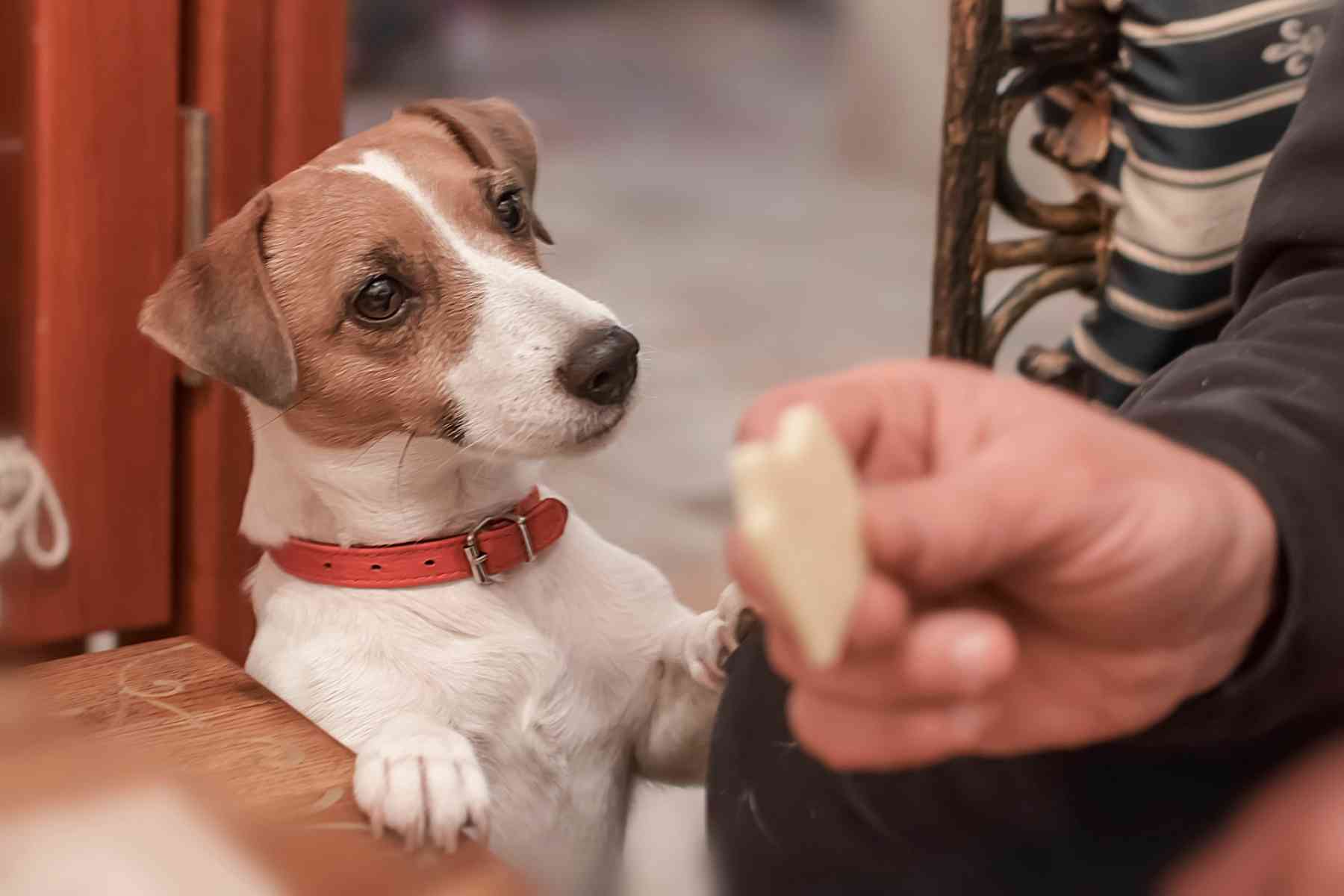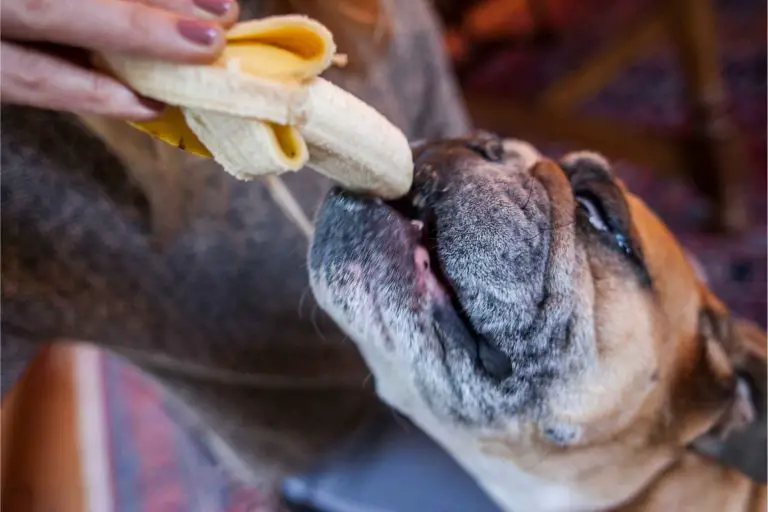Why Do Dogs Love Cheese?

Dogs, as you probably know, tend to be very food-motivated animals, and generally respond well when being coerced with food. Dogs have a preference for a lot of foods that people also enjoy, including peanut butter, eggs, apple slices, and of course cheese.
So, why do dogs love cheese so much? Well, there are probably a few reasons why. For one, cheese contains several vitamins and nutrients that dogs need, and the creamy taste of cheese is quite appealing to most dogs. In addition, cheese contains proteins that, when broken down, have slightly addictive effects.
In this article, we’ll be going over everything you should know about feeding your dog cheese, including how healthy cheese really is for dogs, what kinds of cheese are suitable for dogs, and more.
What’s In Cheese that Makes Dogs Love It?
Almost all dogs love cheese, and it’s easy to see why. It’s for the same reasons people do; cheese is tasty, rich, and easy to eat.
More importantly, cheese contains a bunch of vitamins and minerals that dogs need. These include vitamin A, a number of B-complex vitamins, calcium, and essential fatty acids. Thanks to the high levels of calcium in cheese, eating it every now and then can be good for your dog’s bones and teeth.
There’s also the fact that cheese is, no joke, literally addictive (for both dogs and people). Cheese contains a protein called casein, which when eaten, breaks down in your stomach into a kind of peptide called casomorphin.
Casomorphin interacts with the same receptors in your brain that opioids do, causing the brain to produce more dopamine when these receptors are activated. The same thing happens if a dog should happen to eat some cheese.
Is Cheese Good for Dogs?
There’s definitely nothing wrong with feeding your dog some cheese every once in a while; cheese does indeed contain a lot of stuff that is good for dogs, and cheese can also be used as an effective training tool or as a means of getting your dog to take some medicine that they need.
However, make sure you’re not feeding your dog too much cheese.
Cheese contains a fair amount of salt and fat, and overconsuming salt and fat is going to have negative effects on your dog’s health. Some of these effects include high blood pressure and pancreatitis.
While cheese itself is not toxic to dogs at all, some cheese varieties may contain extra ingredients that are not good for dogs to have. In particular, you should avoid giving your dogs cheese that contains onions, chives, garlic, or other similar herbs, as all vegetables in the onion family are toxic to dogs.
In addition, if your dog is taking medications like marbofloxacin or tetracycline, you should be aware that these medications can’t be taken along with dairy products. If your dog is on any kind of medication, make sure you check in with your vet to clarify if the medication will react poorly with anything else in your dog’s diet.
One more thing; dogs, like people, can also be lactose intolerant. If you’ve never fed your dog cheese before and you’re not sure if they’re lactose intolerant or not, start by feeding them just a little bit of cheese and see how they react. If they start showing signs of an allergic reaction, take them to a vet right away.
What Kind of Cheese Can My Dog Eat?
There are literally hundreds of different types of cheeses that exist. Believe it or not, the type of cheese you feed your dog matters more than you think; some types of cheese are made in such a way that makes them not very good for dogs at all.
Let’s run through a short list of some of the more common types of cheese and explain why your dog can or can’t eat them:
Cottage Cheese
Cottage cheese is one of the best types of cheese to give to your dog. Because of its semi-liquid consistency, it’s very easy to eat, and it’s also lower in fat and sodium than other types of cheese. It also tends to have a lower lactose content than other types of cheeses, meaning it’s easier on dogs with sensitive stomachs.
However, one thing you should keep in mind is that some brands of cottage cheese may contain added milk, which will of course raise the lactose content. This could upset your dog’s stomach if they are sensitive to lactose.
Cream Cheese
In contrast, cream cheese is one of the worst types of cheese to feed your dog. Cream cheese has a ton of fat and is a lot richer than pretty much any other type of cheese. Cream cheese also has a much higher lactose content than other cheeses.
Even if your dog is fine when eating other types of cheeses, you should still avoid feeding them cream cheese since the likelihood that it’ll cause them stomach issues is pretty high.
Swiss Cheese
Swiss cheese is a good cheese for dogs to have. Most of the lactose gets removed from this cheese during the fermentation process, and it’s also quite low in both fat and sodium. As long as you don’t feed them too much, your dogs should be able to enjoy a bit of Swiss every now and then without any problems.
String Cheese
String cheese is just normal mozzarella cheese that has been heated and stretched so that the milk proteins in the cheese line up. When cheese is prepared in this way, it becomes possible to pull thin strips from the larger piece of cheese.
String cheese also contains fairly low levels of lactose and salt, so it’s a pretty safe cheese for dogs to eat as well. However, because of the stringy nature of this cheese, it can be a bit hard to eat, especially for puppies. If you want to feed your dog a bit of string cheese, make sure you cut it up into small pieces first.
Blue Cheese
Blue cheese, as you probably know, is made by introducing mold cultures into a batch of cheese. While it’s usually not a good idea to eat mold, blue cheese doesn’t have a high enough concentration of mold toxins for it to be harmful to humans. However, the same cannot be said for dogs.
The mold in blue cheese produces a toxin called roquefortine C, which is harmful to dogs at pretty much any concentration. Symptoms of roquefortine C poisoning in dogs include vomiting, diarrhea, a fever, and even seizures in severe cases.
This is no doubt clear to you by now, but it’s important enough to state it explicitly: under no circumstances should you ever feed your dog blue cheese.
Parmesan Cheese
Parmesan has a pretty sharp odor, so it’s likely that your dog will be put off from it by the smell alone. Even if they aren’t, you should probably still avoid feeding your dog parmesan.
Parmesan doesn’t contain a lot of lactose or fat, but it is pretty high in sodium. In terms of cheese for dogs, there are plenty of options that are way healthier than parmesan.
Goat Cheese
Finally, we arrive at goat cheese. Goat cheese tends to be pretty high in fat and lactose, so it’s not a good idea to feed your dog goat cheese.
Can Dogs Eat Other Dairy Products?
For the most part, no. Straight-up milk has a lot more lactose than cheese does, which makes it harder for dogs to process. Butter is also out, as it contains a ton of fat, and ice cream is also not great to give to dogs, as it often contains a lot of sugar and artificial sweeteners.
Plain yogurt, on the other hand, is totally fine for dogs to eat in small quantities. If your dog has an upset stomach, giving them a little bit of unsweetened plain yogurt to eat might help them feel a little better.






